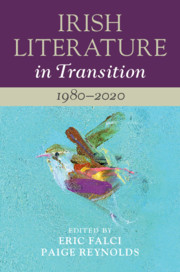Book contents
- Irish Literature in Transition, 1980–2020
- Irish Literature in Transition
- Irish Literature in Transition, 1980–2020
- Copyright page
- Contents
- Contributors
- Series Preface
- General Acknowledgements
- Acknowledgements
- Introduction
- Part I Times
- Part II Spaces
- Part III Forms of Experience
- Part IV Practices, Institutions, and Audiences
- Chapter 16 Mediation and Translation in Irish Language Literature
- Chapter 17 Irish Studies and Its Discontents
- Chapter 18 Historical Transitions in Ireland on Screen
- Chapter 19 Irish Blockbusters and Literary Stars at the End of the Millennium
- Chapter 20 Contemporary Literature and Public Value
- Coda: The Irish Times, Tramp Press, and the Future Present
- Index
Chapter 19 - Irish Blockbusters and Literary Stars at the End of the Millennium
from Part IV - Practices, Institutions, and Audiences
Published online by Cambridge University Press: 28 February 2020
- Irish Literature in Transition, 1980–2020
- Irish Literature in Transition
- Irish Literature in Transition, 1980–2020
- Copyright page
- Contents
- Contributors
- Series Preface
- General Acknowledgements
- Acknowledgements
- Introduction
- Part I Times
- Part II Spaces
- Part III Forms of Experience
- Part IV Practices, Institutions, and Audiences
- Chapter 16 Mediation and Translation in Irish Language Literature
- Chapter 17 Irish Studies and Its Discontents
- Chapter 18 Historical Transitions in Ireland on Screen
- Chapter 19 Irish Blockbusters and Literary Stars at the End of the Millennium
- Chapter 20 Contemporary Literature and Public Value
- Coda: The Irish Times, Tramp Press, and the Future Present
- Index
Summary
As the twentieth century came to a close, America exhibited an insatiable appetite for all things Irish. Thomas Cahill’s How the Irish Saved Civilization (1994) and Frank McCourt’s Angela’s Ashes (1996) ascended the New York Times’ bestseller list. On Broadway, the decade of the 1990s was initiated by two extraordinary Irish plays: Brian Friel’s Dancing at Lughnasa, which moved to New York in 1991 and won a Tony for Best Play, and Frank McGuinness’s Someone Who’ll Watch Over Me (1992). In film, Neil Jordan’s The Crying Game (1992) and Jim Sheridan’s In the Name of the Father (1993) garnered distinguished nominations and awards. But, arguably, the biggest blockbuster of the decade was Riverdance and, along with one of its lead dancers Michael Flatley, the brightest star of the decade was Seamus Heaney, particularly after the October 1995 announcement of his receipt of the Nobel Prize. This essay explores connotations of the terms ‘blockbuster’ and ‘star’ in this context, while also probing the relationships between them and the fans who create them.
Information
- Type
- Chapter
- Information
- Irish Literature in Transition: 1980–2020 , pp. 360 - 374Publisher: Cambridge University PressPrint publication year: 2020
